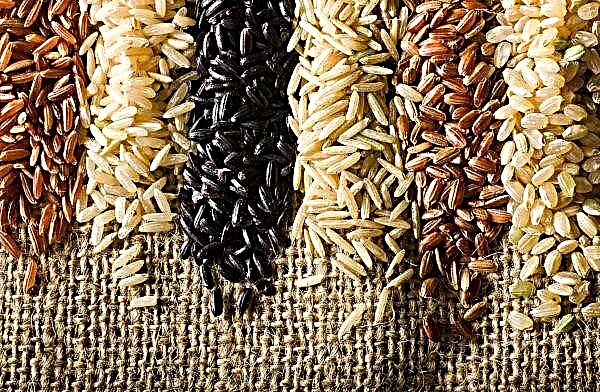Watermelon is not only a juicy and tasty berry, but also an extremely healthy product. Among its valuable properties, a pronounced diuretic effect is noted. However, there are contraindications to the use of these fruits. The benefits and harms of watermelon will be discussed in the article.
Botanical Description
Watermelon (lat. Citrullus) belongs to the genus of flowering pumpkin family. In 1794, it was described by the Swedish botanist Karl Peter Tunberg under the name Momordica lanata. And in the genus of watermelons (Citrullus) was credited in 1916 with the filing of botanists from Japan - Ninzo Matsumura and Takenosin Nakai. The stems of the plant are thin, flexible, branched, creeping, stretching up to 4 m or more. Often they have a rounded-pentagonal cross-section, and young specimens are pubescent with numerous tender, protruding hairs. The leaves are alternate, firmly rough, deeply tripartite, triangular-ovoid in shape with an elongated apex, 8–22 cm long, 5–18 cm wide. In summer, the plant blooms unisexual, boat-shaped flowers 2–2.5 cm in size. The fruit of the crop is multi-seeded juicy pumpkin (berry). Shape, size and color vary by variety. Most fruits have a smooth surface and a green color, often with light stripes. The flesh of the berry is red or pinkish, very juicy, pleasantly sweet.
The leaves are alternate, firmly rough, deeply tripartite, triangular-ovoid in shape with an elongated apex, 8–22 cm long, 5–18 cm wide. In summer, the plant blooms unisexual, boat-shaped flowers 2–2.5 cm in size. The fruit of the crop is multi-seeded juicy pumpkin (berry). Shape, size and color vary by variety. Most fruits have a smooth surface and a green color, often with light stripes. The flesh of the berry is red or pinkish, very juicy, pleasantly sweet.
Does watermelon have a diuretic effect?
One of the beneficial properties of a watermelon is its diuretic effect, i.e. the ability to remove excess water from the body. Due to this effect, it is possible to remove swelling caused by problems with the heart, kidneys or a malfunction of the lymphatic system. The diuretic properties of the berry are associated with the fact that in its pulp there is a high concentration of water and alkaline compounds. Thus, salts precipitated in the urine (oxalate, potassium, urate) are converted into a soluble state by alkali, preventing the formation of sand or stones. A large amount of water forces diuresis, perfectly washing away salts and excess uric acid from the body.
Thus, salts precipitated in the urine (oxalate, potassium, urate) are converted into a soluble state by alkali, preventing the formation of sand or stones. A large amount of water forces diuresis, perfectly washing away salts and excess uric acid from the body.
Important! It is believed that the most diuretic part of the watermelon is the white layer between the green peel and red pulp of the fetus.
For what purposes is watermelon used as a diuretic?
The ability of a watermelon to remove excess fluid from the body is used both in the treatment of certain diseases and for weight loss.
Disease treatment
Watermelon is an excellent natural medicine that helps in the treatment of many diseases. Some nutritionists and naturopathic doctors even compare it with "living water" from folk tales.
- Valuable qualities of the fetus:
- has a pronounced cleansing and diuretic property, perfectly removes edema;
- helps to dissolve sand and kidney stones and remove them from the body;
- regulates acid-base balance, which is especially useful for people with chronic kidney ailments;
- a high concentration of iron helps the process of blood formation, the work of the heart and blood vessels, the functioning of the glands of internal secretion;
- magnesium is essential for the proper functioning of the heart and blood vessels;
- folic acid is indispensable for anemia, problems with the blood forming organs, during pregnancy and lactation;
- fiber improves the digestive tract, enhances bowel function, helps to cope with constipation;
- promotes the removal of "bad" cholesterol from the blood, has a slight anti-inflammatory effect;
- gives a feeling of satiety and, in combination with a diuretic effect, is extremely useful for losing weight;
- a decoction of crusts is used to cleanse the bile ducts, with colitis and gastritis.
Important! In order not to provoke a deterioration in the condition, treatment by any alternative methods should be carried out exclusively under the supervision of a doctor.
In addition to the pulp, a decoction of watermelon peels can be used as a diuretic. To do this, take 1 part of crushed crusts, pour 10 parts of clean water and boil for several minutes. Take the drug 3-4 times a day for 0.5 cups. The dried fruit peel, taken in 0.5 tsp., Also has a strong diuretic effect. before meals.
Weight loss
Dieters know how difficult it is to decide on a suitable diet, and finding a product that is not only tasty but also useful for losing weight is a real success. This product is watermelon. It makes it possible to quickly get enough, not to feel hunger and not to consume extra calories. Moreover, the diuretic effect of the fruit will make weight loss more effective.
Did you know? In many countries, it is customary to eat not only the flesh of watermelon, but also its peel. So, the Chinese often fry it, marinate or stew it. And the seeds of the fruits are dried, using as a snack.
Many losing weight have successfully experienced the following diet - watermelon for breakfast and lunch. If you feel hungry, you can add a couple of slices of brown bread. It should only be noted that the diet is suitable for people with a healthy gastrointestinal tract. Otherwise, consult a doctor. And introduce the berries into the diet gradually, observing the reaction of the body.
Nutritionists note the following positive points from the use of the product:
- prolonged chewing and swallowing creates the feeling of consuming a large-calorie meal;
- the taste of the berry makes it possible to fill the desire to eat something sweet;
- the flesh of the fetus fills the stomach and makes you forget about the feeling of hunger.
One of the good methods of using this berry during the diet is a watermelon fasting day. It consists of eating up to 2.5 kg of watermelon pulp throughout the day. Such unloading can be arranged no more than 2 times a week, eating the prescribed amount of 5-6 receptions.
Did you know? The Guinness Book of Records notes the heaviest watermelon, which showed 159 kg on a reference scale! It was grown in 2013 by the American farmer Chris Kent.
When introducing fruits into the daily diet, you can use the following effective methods:
- Instead of fruit juices or sweet sparkling water, prepare watermelon juice - pour frozen pieces of pulp with clean water. The result is a pleasant, refreshing drink with minimal calories.
- Replace part of a high-calorie product with several slices of watermelon of the same volume. This will “deceive” the brain and reduce the total calorie intake.
- Choose a watermelon as a dessert. By adding it to fruit salads or low-fat yogurts, you can make up the need for dessert without consuming extra calories.
- Spend a watermelon fasting day at least once a week. This will remove excess water from the body and shift weight in the case of a long plateau.

Possible contraindications
- Despite the great benefits of watermelon, in some cases it is not recommended for use. So, contraindications are:
- an allergic reaction to the product;
- diabetes;
- indigestion and exacerbation of colitis;
- exacerbation of gastrointestinal diseases;
- exacerbation of diseases of the urinary system.
In other cases, watermelon is not only a tasty and healthy treat, but also a great way to improve the body, relieve swelling and lose weight. Feel free to include it in your diet and enjoy the result!












